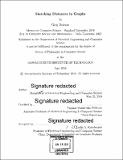Sketching distances in graphs
Author(s)
Bodwin, Greg (Gregory MIchael)
DownloadFull printable version (12.70Mb)
Other Contributors
Massachusetts Institute of Technology. Department of Electrical Engineering and Computer Science.
Advisor
Virginia Vassilevska Williams.
Terms of use
Metadata
Show full item recordAbstract
Often in computer science, graphs are used to represent metrics: the nodes represent "locations," and the edges represent connectivity between locations. The salient properties of such a graph are the shortest path distances between its nodes - that is, the minimum length of a path from each point A to each point B, capturing the time or resource cost of travelling from one place to another in the space represented by the graph. There are plenty of nice algorithms and structure theorems that are used to understand or analyze shortest path distances. However, in the modern computing, we sometimes have to handle spaces that are too enormous to be efficiently handled by these classic methods. When this happens, it is often useful to "sketch" these enormous spaces, designing a graph or data structure that approximately encodes the distances of the original network, but in much smaller space. This dissertation is about the design of these graph sketches that encode distances. Some of the content will cover upper bounds: we will demonstrate some new ways to make sketches, and we will prove things about the tradeoff between the size of these sketches and their approximation error. Some of the content will cover lower bounds: we will design some very particular graphs, and we will prove that a certain size vs error tradeoff can't be achieved any sketch on these graphs. We will do this for a few different reasonable notions of "approximation" of distances. We will also consider some of these settings in the fault-tolerant model, where we imagine that nodes or edges of the graph can spontaneously "fail," and we want our sketches to be strongly robust to these failures.
Description
Thesis: Ph. D. in Computer Science, Massachusetts Institute of Technology, Department of Electrical Engineering and Computer Science, 2018. Cataloged from PDF version of thesis. Includes bibliographical references (pages 131-144).
Date issued
2018Department
Massachusetts Institute of Technology. Department of Electrical Engineering and Computer SciencePublisher
Massachusetts Institute of Technology
Keywords
Electrical Engineering and Computer Science.